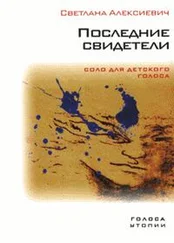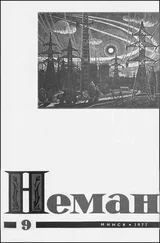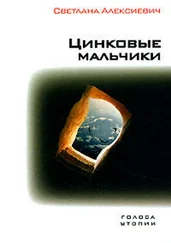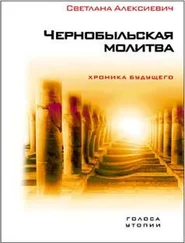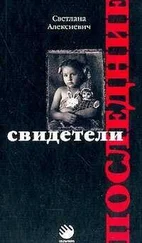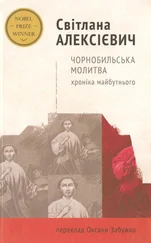Светлана Алексиевич - Chernobyl Prayer - A Chronicle of the Future
Здесь есть возможность читать онлайн «Светлана Алексиевич - Chernobyl Prayer - A Chronicle of the Future» весь текст электронной книги совершенно бесплатно (целиком полную версию без сокращений). В некоторых случаях можно слушать аудио, скачать через торрент в формате fb2 и присутствует краткое содержание. Год выпуска: 2016, ISBN: 2016, Издательство: Penguin Books Ltd, Жанр: Биографии и Мемуары, на английском языке. Описание произведения, (предисловие) а так же отзывы посетителей доступны на портале библиотеки ЛибКат.
- Название:Chernobyl Prayer: A Chronicle of the Future
- Автор:
- Издательство:Penguin Books Ltd
- Жанр:
- Год:2016
- ISBN:9780241270547
- Рейтинг книги:3 / 5. Голосов: 1
-
Избранное:Добавить в избранное
- Отзывы:
-
Ваша оценка:
- 60
- 1
- 2
- 3
- 4
- 5
Chernobyl Prayer: A Chronicle of the Future: краткое содержание, описание и аннотация
Предлагаем к чтению аннотацию, описание, краткое содержание или предисловие (зависит от того, что написал сам автор книги «Chernobyl Prayer: A Chronicle of the Future»). Если вы не нашли необходимую информацию о книге — напишите в комментариях, мы постараемся отыскать её.
Chernobyl Prayer: A Chronicle of the Future — читать онлайн бесплатно полную книгу (весь текст) целиком
Ниже представлен текст книги, разбитый по страницам. Система сохранения места последней прочитанной страницы, позволяет с удобством читать онлайн бесплатно книгу «Chernobyl Prayer: A Chronicle of the Future», без необходимости каждый раз заново искать на чём Вы остановились. Поставьте закладку, и сможете в любой момент перейти на страницу, на которой закончили чтение.
Интервал:
Закладка:
Again, like a game, a promotional trip, I lead a convoy of humanitarian aid donors. Outsiders, foreigners … They come to us in the name of Jesus and in the name of who knows what else. And there are my fellow tribesmen, standing in the puddles and the mud, in jerseys and quilted jackets, in cheap boots … ‘We don’t need anything! The officials will only steal it!’ I read in their eyes. But immediately, alongside that, the urge to grab a box, a crate of something foreign. We know by now what kind of old woman lives where. Like in a zoo. It’s humiliating, and I feel a wicked, crazy urge. I sometimes suddenly say to them: ‘Now we’re going to show you something you could never see, even in Africa. There’s nothing like it anywhere else in the world! Two hundred curies, 300 curies …’ I notice too how the old women themselves have changed. Some have become real film stars. They’ve memorized their lines, and will shed a tear in just the right places. When the first foreigners came, they used to say nothing, just weep. Now, though, they’ve learned to talk. With a bit of luck, there’ll be some chewing gum for the children, or a carton of clothing might come their way. Who knows? And this coexists with a philosophical profundity, with the fact that they have a special relationship here with death and time. They refuse to abandon their cottages, their families’ graveyards; and that’s not because of German chocolate, or chewing gum.
On our way back, I point out to them: ‘See what a beautiful land this is!’ The sun has sunk low on the horizon, lighting up the forest and fields, a gift to us as we are leaving. ‘Yes,’ someone in the German group who speaks Russian replies, ‘beautiful, but poisoned.’ He is holding a dosimeter.
I realize that this sunset is dear only to me. This is my native land.
Natalia Arsenyevna Roslova, chairwoman of the Mogilyov
Women’s Committee of Children of Chernobyl
The Children’s Choir
Alyosha Belsky, aged nine; Anya Bogush, ten; Natasha Dvoretskaya,
sixteen; Lena Zhudro, fifteen; Yura Zhuk, fifteen; Olya Zvonak, ten;
Snezhana Zinevich, sixteen; Ira Kudryacheva, fourteen; Yulya Kasko,
eleven; Vanya Kovarov, twelve; Vadim Krasnosolnyshko, nine; Vasya
Mikulich, fifteen; Anton Nashivankin, fourteen; Marat Tatartsev,
sixteen; Yulya Taraskina, fifteen; Katya Shevchuk, fourteen; Boris
Shkirmankov, sixteen.
I was in hospital …
I was in such pain. I said to my mother: ‘Mum, I can’t stand it. It’s best if you kill me!’
There was this black cloud … This really heavy rain …
The puddles turned yellow … and green … as if someone had poured paint in them. People said it was just pollen from the flowers. We didn’t run through the puddles, just looked at them. Grandma shut us in the cellar. She knelt down and prayed. She told us to pray too. ‘Pray! It’s the end of the world. God’s punishment for our sins.’ My brother was eight and I was six. We started remembering our sins: he had broken a jar of raspberry jam, and I hadn’t told Mum my new dress had got caught on the fence and torn … I hid it in the wardrobe.
Mum often wears black. A black headscarf. On our street, someone is getting buried all the time. People cry. If I hear music, I run home and pray. I say the Lord’s Prayer.
I pray for my mum and dad …
Soldiers in trucks came to take us away. I thought a war had started …
The soldiers had real rifles hanging from their shoulders. They said words I couldn’t understand: ‘decontamination’, ‘isotopes’ … On the journey, I had a dream: there was an explosion, but I was alive! My home had gone, my parents. There were not even any sparrows and crows. I woke up in horror. I jumped up. I peeped through the curtains to see if there was that nightmarish mushroom cloud in the sky.
I remember a soldier chasing a cat. It made the radiation meter rattle like a machine gun: click-click-click. A boy and girl were running after them: it was their cat. The boy didn’t say anything, but the girl was shouting, ‘You can’t have her!’ She shouted as she ran, ‘Pussy, run for it! Run, pussy!’
The soldier had a big plastic bag.
We left my hamster at home when we locked everything up. He was a little white hamster. We gave him enough food for two days.
But we never went back.
It was the first time I had been on a train …
The train was packed with children. The little ones were screaming and dirtying themselves. There was one carer for every twenty children and they were all crying, ‘Mummy! Where’s my mummy? I want to go home!’ I was ten. The girls like me helped to calm the little ones down. Women met us on the train platforms and made the sign of the Cross over the train. They brought us biscuits they had made, and milk and warm potatoes …
We were taken to Leningrad Province. There, when we were approaching the stations, people made the sign of the Cross, but watched us from far away. They were afraid of our train, and at every station they washed it down for a long time. When we jumped out at one station and ran to the buffet, they stopped anybody else going in: ‘Chernobyl children are eating ice cream in there,’ they said. The woman at the counter told someone over the phone, ‘When they leave, we’ll wash the floor with bleach and boil the glasses.’ We heard that.
Some doctors met us. They were wearing gas masks and rubber gloves. They took our clothes and all our things away, even our envelopes and pens and pencils, and put them in plastic bags and buried them in the forest.
We were so scared. For a long time afterwards, we were expecting we would start to die.
Daddy kissed Mummy and I was born …
I used to think I would never die, but now I know I will. A boy was lying next to me in the hospital. He was called Vadik Korinkov. He drew little birds for me, little houses. He died. Dying isn’t frightening. You just sleep for a long, long time and don’t wake up. Vadik told me that, when he died, he would live in another place for a long time. One of the older boys told him. He wasn’t frightened.
I dreamed I died. I could hear my mummy crying in my dream and woke up.
We were leaving …
I want to tell you how my grandma said goodbye to our house. She asked my dad to bring a sack of millet from the pantry, and scattered it over the garden, ‘For God’s birds.’ She collected eggs in a sieve and scattered them through the farmyard, ‘For our cat and dog.’ She sliced up pork fat for them. She emptied all the seeds out of her little bags: carrots, pumpkins, cucumbers, her blackseed onions, all the different flowers … She shook them out over the vegetable plot: ‘Let them live in the soil.’ Then she bowed to the house. She bowed to the barn. She went round and bowed to every apple tree.
My grandfather, when we were going away, took his hat off.
I was little …
Six, no, eight I think. Yes, eight. I’ve just counted it. I remember there was so much to be afraid of. I was afraid of running barefoot on the grass. Mum warned me I would die if I did. Swimming, diving – I was scared of everything. Picking nuts in the forest. Lifting up a beetle … because he crept over the ground, and it was infected. Ants, butterflies, bumblebees – they were all infected. My mum remembers they told her at the pharmacy to give me a teaspoonful of iodine. Three times a day! But she was too frightened …
We were waiting for spring: would the daisies come up again, like they did before? Everybody was saying the world was going to change. On the radio and television … The daisies were going to turn into … what? Into something else, anyway. And the foxes would grow a second tail. The hedgehogs would be born without prickles, the roses would have no petals. People would appear, and they would be like humanoids and be coloured yellow. They would have no hair, no eyelashes. Only eyes. And the sunsets would be green, not red.
Читать дальшеИнтервал:
Закладка:
Похожие книги на «Chernobyl Prayer: A Chronicle of the Future»
Представляем Вашему вниманию похожие книги на «Chernobyl Prayer: A Chronicle of the Future» списком для выбора. Мы отобрали схожую по названию и смыслу литературу в надежде предоставить читателям больше вариантов отыскать новые, интересные, ещё непрочитанные произведения.
Обсуждение, отзывы о книге «Chernobyl Prayer: A Chronicle of the Future» и просто собственные мнения читателей. Оставьте ваши комментарии, напишите, что Вы думаете о произведении, его смысле или главных героях. Укажите что конкретно понравилось, а что нет, и почему Вы так считаете.

